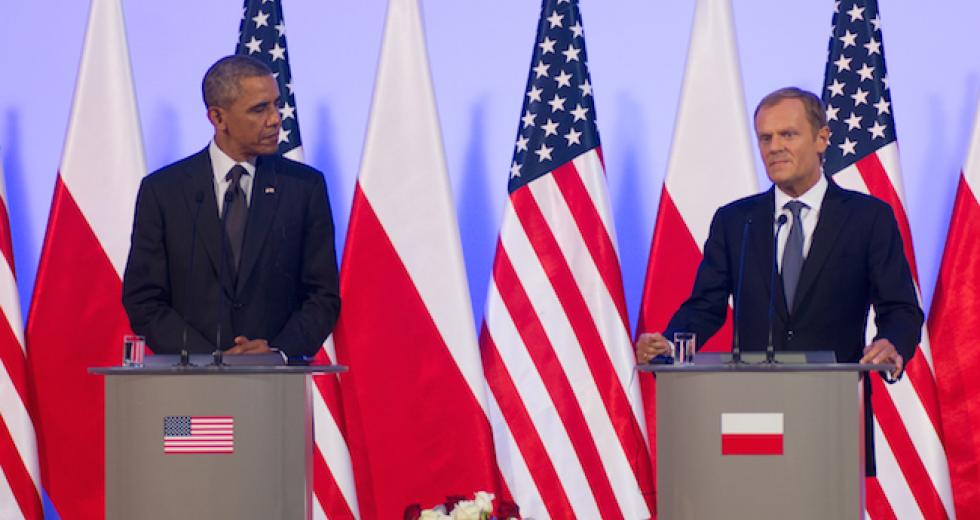
No sooner was Tusk named EC president that he got on the phone with U.S. President Barack Obama Dec. 1 to make immediate strides on none other than the Transatlantic Trade and Investment Partnership, or T-TIP.
While ISIS and Ebola headlines swallow metric tons of ink and paper in the world’s newspapers, T-TIP has been quietly advancing. Yet T-TIP encompasses a larger chunk of the globe than ISIS or Ebola could ever hope to control.
And T-TIP is cut from the same “corporate cloth” as the North American and Central American Free Trade Agreements that have ravaged Western Hemisphere economies.
The European Union Delegation to the U.S., whose Washington office along “lobby row” at 2175 K Street, is a key conduit in the ongoing drive to merge at least some governmental operations and economic regulations of the EU and the U.S.
When that Delegation issued a news bulletin Dec. 2 to announce the appointment of Tusk as European President, the high priority that Tusk gave to contacting Obama took center stage.
In that bulletin, Tusk remarked: “I was pleased today [Dec. 1] to speak to the President of the United States, Barack Obama ... I was happy to hear the American President ́s equally strong commitment to our transatlantic bond.”
Tusk’s personal leanings are mixed; the record shows he has fits of common sense, yet he’s devoted to the “free market” concept that provides cover for keeping real accountability away from large banks and corporations, while offering the big economic players protection at virtually every turn.
Tusk wasted no time in confirming the central topic at hand, saying: “We discussed the important work ahead ... in negotiating the Transatlantic Trade and Investment Partnership ... The T-TIP is not just about free trade; it is an expression of our geopolitical partnership. We agreed to step up our efforts ...”
As this writer has determined covering various Washington think tanks that worship the golden calf of free trade, the EU-U.S. relationship is based as much on a merger as a simple partnership.
The words “geopolitical partnership” are “code” for the planned close-knit interaction between the U.S. and the EU that clearly is pointing toward the merging of their respective regulatory systems to manage the T-TIP framework.
And that framework is a key building block in a top-down global economic system custom-made for big banks and corporations that are installing in T-TIP a tribunal with which to challenge national laws unfavorable to free trade.
So, if a given country bans genetically-modified crops or foods, the T-TIP tribunals could enable a GMO company like Monsanto to override that nation’s laws, regardless of whether the GMO ban was voted into law by the people or by their elected parliament.
According to Tusk, that “partnership” also includes closely dealing with the Western version of the Ukraine crisis. That includes sanctions against Russia and “financial support to Ukraine.”
Regarding his chat with Obama, Tusk remarked: “We ... agreed on how important it is for Russia to withdraw from eastern Ukraine ...”
Tusk, who touched on the need for the EU and America to further strengthen NATO ties, remarked that the OSCE (Organization for Security and Cooperation in Europe) that has been monitoring Russia’s alleged aggression against Ukraine needs EU and U.S. support.
However, the trusted Canadian research news site Global Research has noted that OSCE observers “have registered no troops, ammunition or weapons crossing the Russian-Ukrainian border over the past two weeks,” Russian news sources from Aug. 20 to Sept. 3, 2014. Nobody is saying Putin is a blameless saint. But even now, Ukraine’s central government appears to playing the victim while, in fact, it’s the chief aggressor, even as it pins most of the blame for the armed conflict on Russian “separatists.”
“The observers noticed a net increase of young people (both men and women) wearing military-style dress crossing the border in both directions but did not observe any weapons among these groups,” Global Research added at the time.
The new EC president’s collaboration with Obama also means that the recent address to the U.S. Congress by Ukraine President Petro Poroshenko may yet reward Petro with the U.S. tax dollars and equipment he sought to fight Russia—the kind of conflict into which the U.S. could be dragged against an established nuclear power.
Meanwhile, Global Research writer James Petras is sounding a loud alarm about Ukraine acting in association with NATO in what may be a planned ethnic cleansing of southeast Ukraine.
Petras noted: “The democratically elected ‘compromise regime’ in Kiev was overthrown in February 2014 in a violent putsch, which installed a pro-NATO junta.”
Petras added that the recent G20 meeting in Australia featured “a rabble-rousing chorus” of Western leaders against Russian President Vladimir Putin, who “finally responded by expanding Russia’s air and ground troop preparedness along its borders while accelerating Moscow’s economic pivot to Asia. Putin has announced that Russia cannot stand by and allow the massacre of a whole people in the Donbas region.”
So, Petras asked whether Poroshenko’s possible forthcoming blitz against east Ukraine is designed to provoke a Russian response to the humanitarian crisis: “Will Russia confront the NATO-directed Kiev offensive and risk a total break with the West?”
The writer is roving editor for AmericanFreePress.net and AFP’s Bilderberg reporter. Email him at truthhound2@yahoo.com
